On 6 May 1997, the British current affairs program Cook Report broadcast a video called Making a Killing that pried open the lid of the canned lion hunting industry in South Africa, using a sting operation.
The public outcry caused by this exposé led to a prohibition on the hunting of several predators, including lions, within 24 months of their release, but the South African Predator Breeders’ Association (SAPBA) challenged the prohibition, and in 2010 the Supreme Court of Appeal ruled in SAPBA’s favour on the basis of a lack of evidence that 24 months was required for a captive-bred lion to become self-sufficient in the wild.
Another big push in the campaign to protect lions came in 2015 from a documentary called Blood Lions which used similar undercover techniques to show unambiguously how brutally exploitative the captive breeding industry is. Following the film, the import of trophy corpses of captive lions was banned by Australia, France and then the US, and the value of captive lions rapidly dropped.
Over the past few years, South Africa has committed to ending the canned hunting and captive breeding of lions. Some commercial breeders have defied the government’s directive and the ban on breeding is still not a solution to the even more insidious problem of bone trade.
Read more in Daily Maverick: “Bones of contention – fate of thousands of captive lions in SA depends on implementation of government report findings”
Despite the legal progress being made to protect South Africa’s indigenous big cats, the same is not true for those from other parts of the world such as tigers. The legal distinction between indigenous animals and “exotic” animals means that even though many of the reasons to prohibit breeding are the same, the fight has to be won a second time.
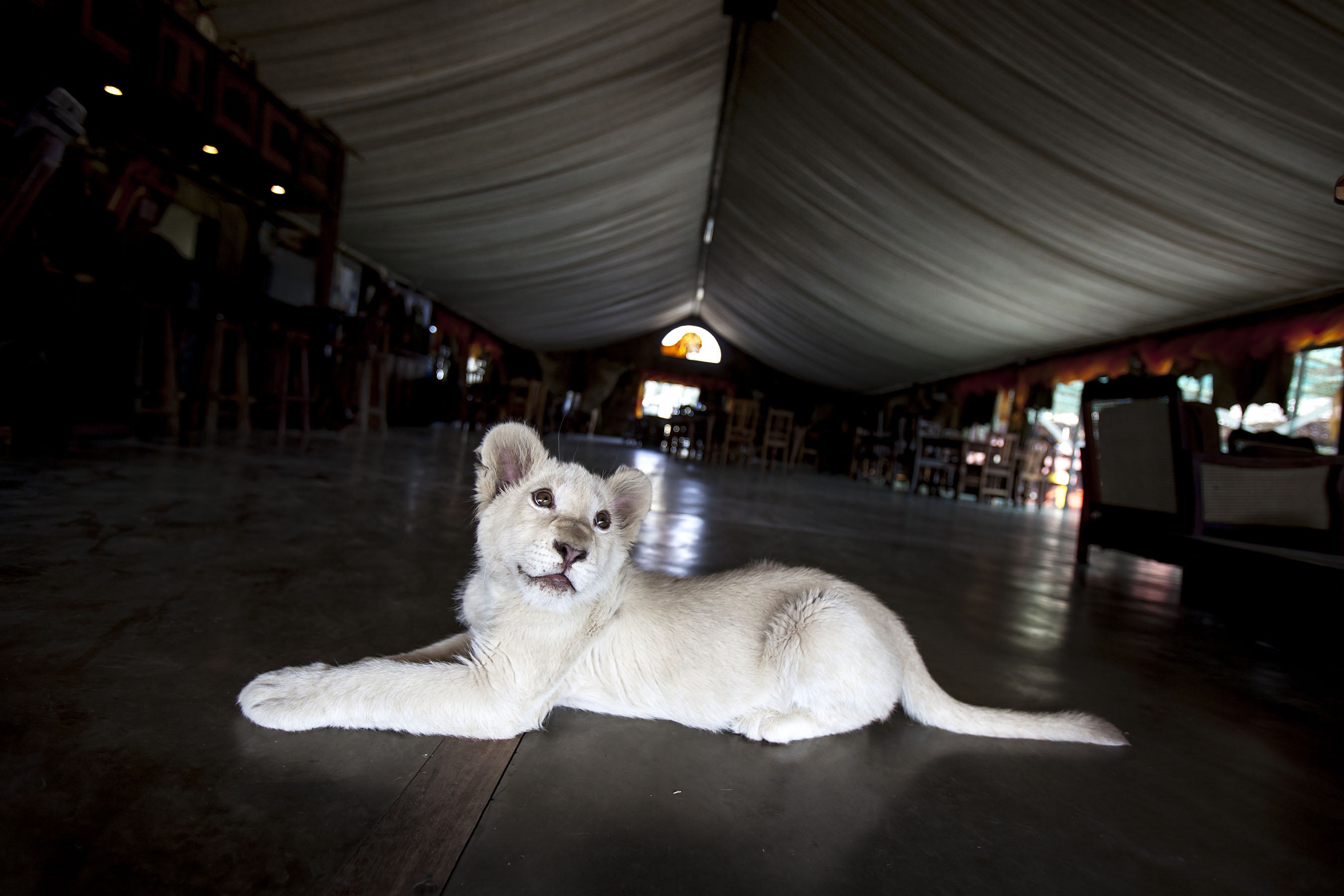 A lion cub lies on the floor of a bar at the Weltevrede Lion Farm on May 23, 2013 in Heilbron, South Africa. Image: Gallo Images / The Times / Daniel Born)
A lion cub lies on the floor of a bar at the Weltevrede Lion Farm on May 23, 2013 in Heilbron, South Africa. Image: Gallo Images / The Times / Daniel Born)
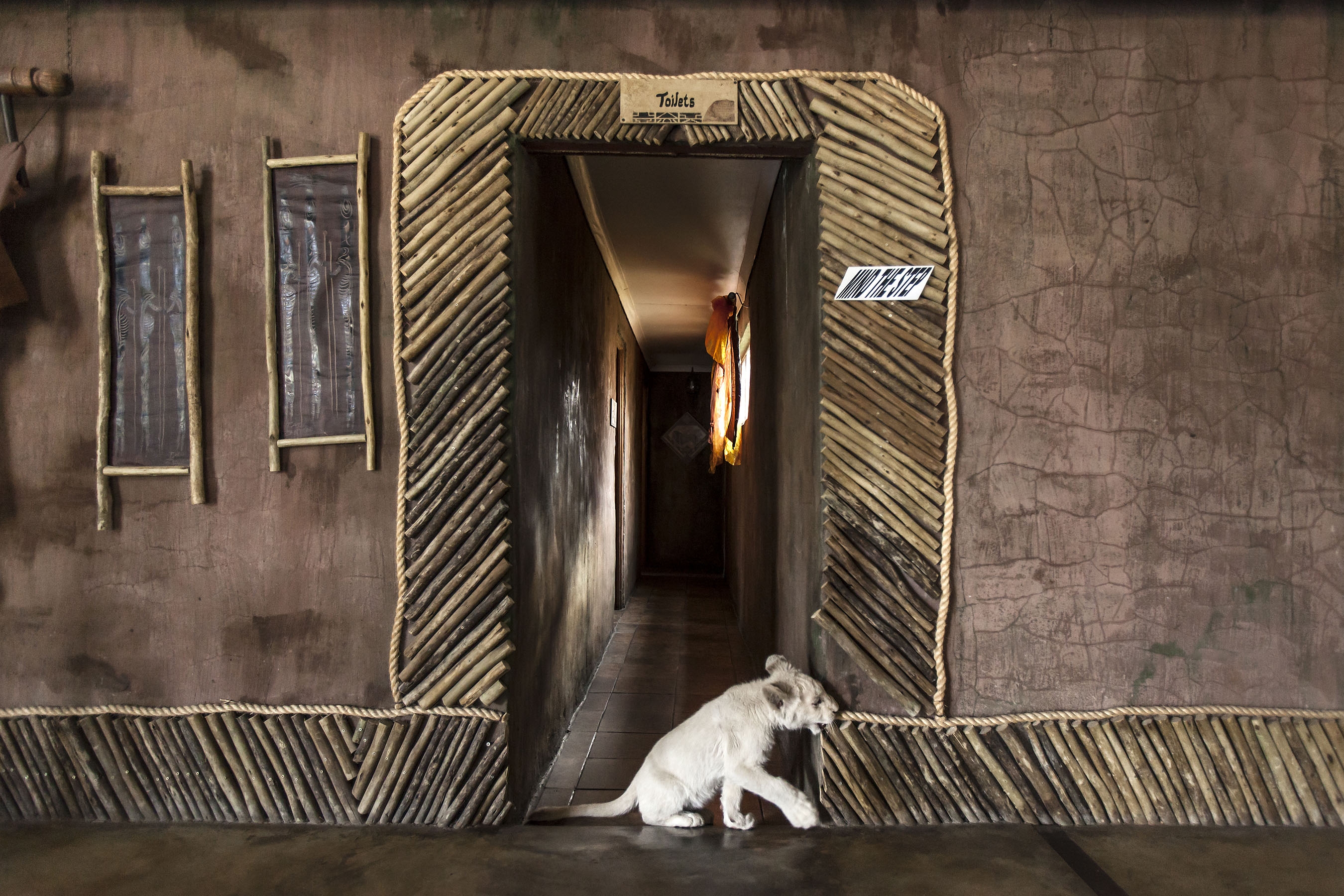 A lion cub chews the skirting of a bar at the Weltevrede Lion Farm on May 23, 2013 in Heilbron, South Africa. Image: Gallo Images / The Times / Daniel Born
A lion cub chews the skirting of a bar at the Weltevrede Lion Farm on May 23, 2013 in Heilbron, South Africa. Image: Gallo Images / The Times / Daniel Born
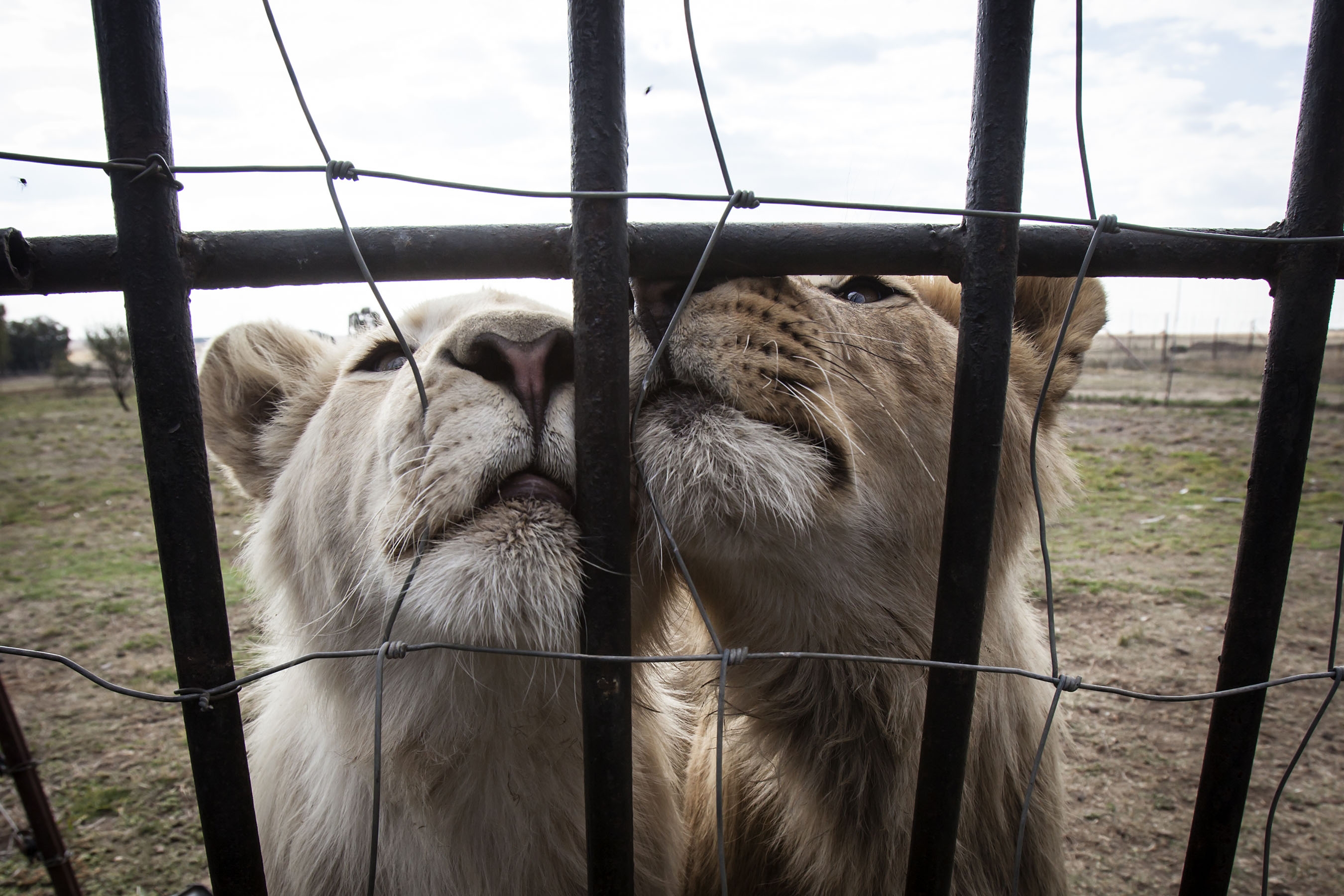 Two young lions stand at the fence at the Weltevrede Lion Farm on May 23, 2013 in Heilbron, South Africa. Image: Gallo Images / The Times / Daniel Born
Two young lions stand at the fence at the Weltevrede Lion Farm on May 23, 2013 in Heilbron, South Africa. Image: Gallo Images / The Times / Daniel Born
The distinction between indigenous and exotic animals
The National Environmental Management: Biodiversity Act 10 (NEMBA) classifies non-indigenous animals – “species imported into the Republic as a result of human activity” as “exotic”.
Bool Smuts is the director of the Landmark Foundation, a conservation NGO that gives input on government legislation and also litigates against administrators and individuals that contravene the few protections that wildlife species do have; he explains that indigenous species have a special designation within the law. They are referred to as Threatened Or Protected (TOP) species and thereby given several layers of protection under national law. But regulations for exotic animals are determined by provincial ordinances and they are not given that special protection – they can essentially be owned as property, and because of the history of South African law, that drastically changes the way they can be handled.
Visit Daily Maverick’s home page for more news, analysis and investigations
“Once you own something, you can kill it. That’s the nature of the South African legislation. South African law was inherited from Roman times; that’s why it’s called Roman-Dutch. Wealthy Romans wanted to protect their property from the proletariat, and that’s what led to the development of what is now ‘common law’ – the law that’s built up by precedent. And of course, who can go to court? The wealthy. So generally speaking, it’s the wealthy that sets the precedent.
“So that’s why to this day, your dog is an item of property. There are lots of people agitating for Rights of Nature – better laws for animals or non-human living things like rivers, because now in South Africa, animals and natural features have no rights. The Romans had no way of dealing with wild animals so it was decided that they were res nullius – they don’t belong to anybody, and only the state had the right to issue their ownership, through a permit system,” says Smuts.
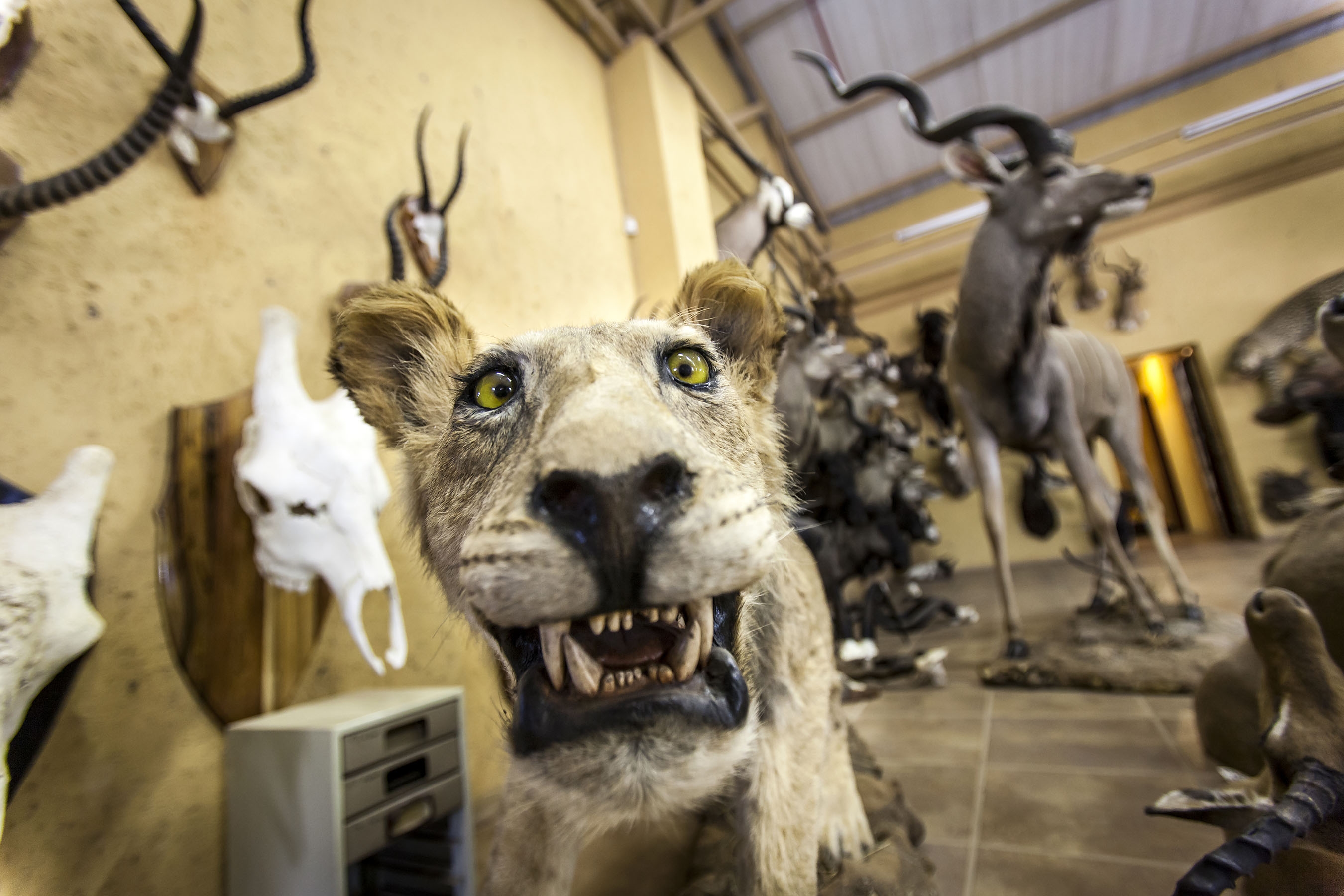 A taxidermied lion is seen at Big Buck Taxidermy on May 22, 2013 in Pretoria, South Africa. Image: Gallo Images / The Times / Daniel Born
A taxidermied lion is seen at Big Buck Taxidermy on May 22, 2013 in Pretoria, South Africa. Image: Gallo Images / The Times / Daniel Born
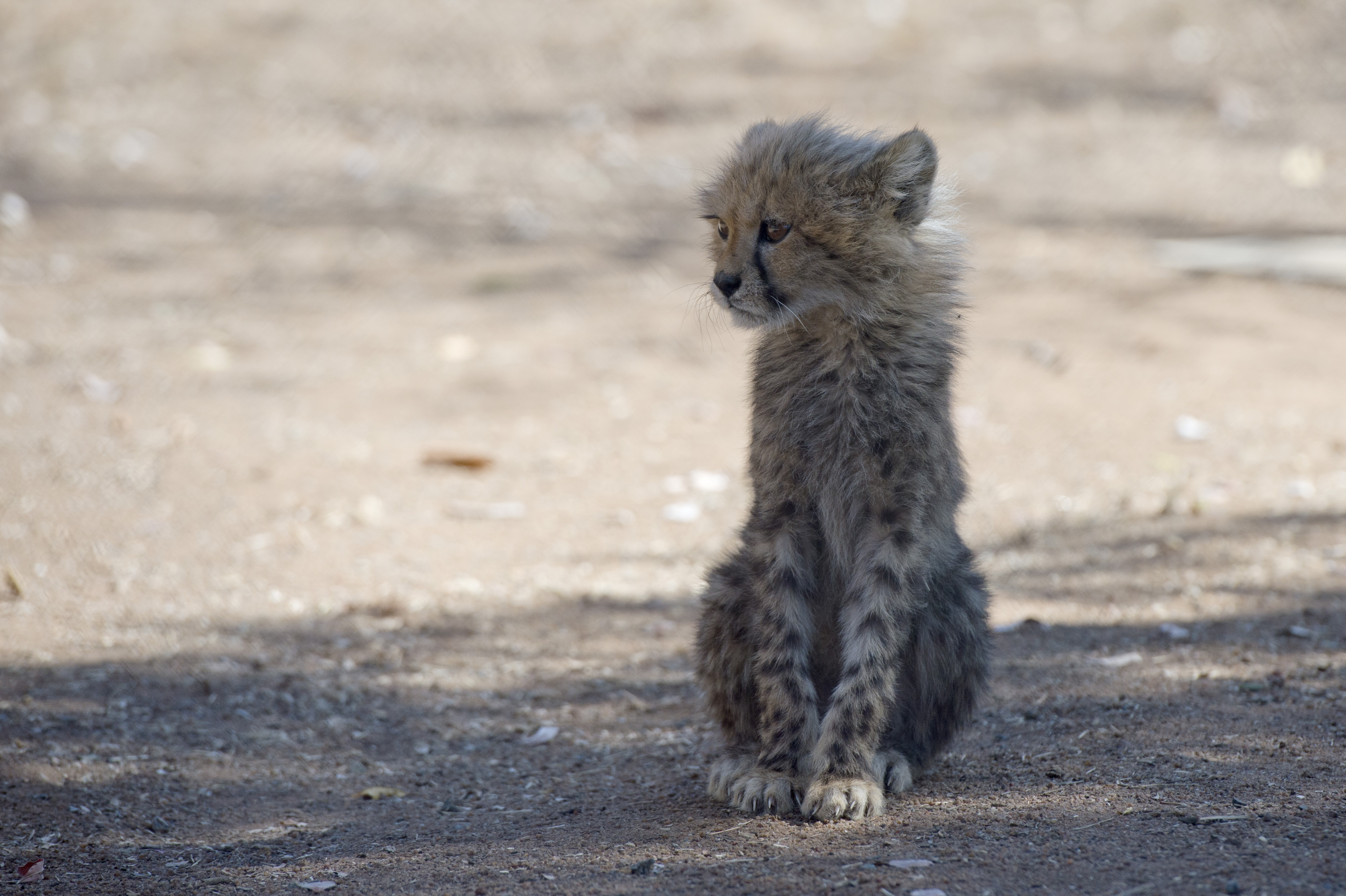 A cheetah seen at Willie Jacobs’s farm, Ukutula Lodge on July 31, 2015 in Brits, South Africa. At the time, Jacobs’s farm was heavily criticised after the release of the documentary ‘Blood Lions’, which details the distasteful practices of canned lion breeders and hunters. Image: Gallo Images / Rapport / Herman Verwey
A cheetah seen at Willie Jacobs’s farm, Ukutula Lodge on July 31, 2015 in Brits, South Africa. At the time, Jacobs’s farm was heavily criticised after the release of the documentary ‘Blood Lions’, which details the distasteful practices of canned lion breeders and hunters. Image: Gallo Images / Rapport / Herman Verwey
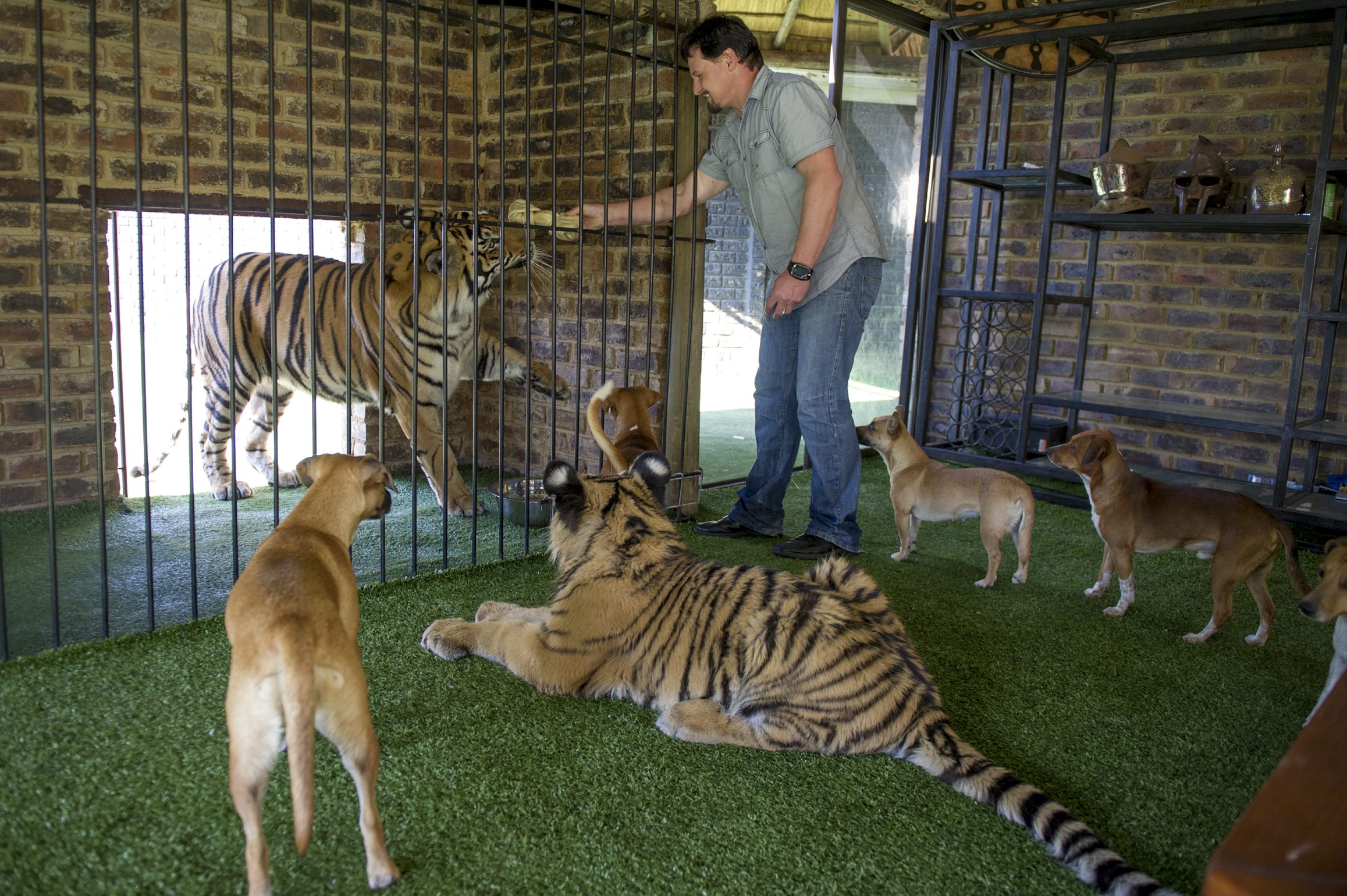 Michael Jamison with his two tigers and some of his hounds on May 31, 2013, in Brakpan, South Africa. Jamison adopted Ozzy, in addition to his 15 dogs and two-year-old Bengal tiger. Ozzy has deformed legs and feet as a result of malnutrition from his previous owners. Image: Gallo Images / Foto24 / Christian Kotze
Michael Jamison with his two tigers and some of his hounds on May 31, 2013, in Brakpan, South Africa. Jamison adopted Ozzy, in addition to his 15 dogs and two-year-old Bengal tiger. Ozzy has deformed legs and feet as a result of malnutrition from his previous owners. Image: Gallo Images / Foto24 / Christian Kotze
What are the rules and restrictions pertaining to exotic big cats in South Africa?
Regulations pertaining to exotic big cats differ by province. Douglas Wolhuter, national chief inspector manager of the wildlife protection unit at NSPCA, explains:
“Some provinces require permits. In the Western Cape, for example, getting hold of a tiger to keep as a pet would be damn near impossible – you’d have to have a permit to bring the animal into the province and there are strict rules and policies and regulations which organisations such as Panthera have to adhere to in terms of keeping these animals.”
However, Wolhuter adds that no permit is required to own exotic animals in Gauteng, North West, Mpumalanga and Limpopo, so effectively, one could keep a non-indigenous apex predator in an agricultural zone without any paperwork.
Northern Cape, Eastern Cape, Western Cape, KwaZulu-Natal and Free State all require permits for the import, export and transport of exotic animals, as well as for possession and keeping permits. In the Western Cape, one would also require a Wild Animal Captivity Permit to be issued by CapeNature. All nine provinces also require that an owner provide the safe enclosure of exotic animals.
But Smuts feels these legislations are not properly enforced and, he says, many of the regulations are not formalised, so there are scarce guidelines, for example, as to what constitutes safe enclosure.
“If you want to buy an exotic tiger, for instance, you’d buy it from a person that is lawfully the owner of that animal, and that’s usually one of the breeding farms. Whether you’d require permits, and which kinds, would then be stipulated by virtue of your provincial ordinance, not the biodiversity act. So the province would then say, you can hold the animal provided you have safe enclosure for it … that safe enclosure may be your lounge; it could be anything as arbitrary as that. It’s more a public safety issue than biodiversity. Exotic big cats are regulated because they are dangerous animals.
“Of course you would also be subject to the Animal Protection Act, which states that the animal must be well cared for, but those legislations are extremely poorly implemented, and that’s why you get all these tigers walking around. The ethics surrounding people that hold these animals in various facilities are highly questionable.”
An important gauge of strictness for any regulation is the severity of the repercussions for contravening it. The Animal Protection Act (APA), which was last amended in 1998, deals with animal cruelty generally, and caps the penalty for animal-related offences stipulated in the document at R4,000 or imprisonment of up to 12 months. (page 14) Over and above that, penalties regarding exotic animals will depend on the province in which the crime was committed.
However, in terms of indigenous animals, (such as lions) as of its amendment of 2022, the National Environmental Management Laws Amendment Act 2 of 2022 (NEMBA, page 18) states that those found guilty of restricted activities such as breeding, hunting, export and so on will incur an administrative fine of up to R10-million, be imprisoned, or both.
Why environmentalists argue for tighter regulations
Smuts thinks that there are two primary reasons why people want better regulations:
“Firstly, we don’t believe there’s any conservation merits in retaining these species in captivity. There’s no benefit to conservation to have a tiger in captivity in South Africa. Zero. Secondly, many people disagree ethically with allowing animals to live unnatural, cruel lives in captivity.”
From both a legal and ethical perspective, Wolhuter, who speaks on behalf of the NSPCA, adds: “We believe there has to be much stronger regulation for the animals themselves from an animal welfare perspective, in terms of the conditions they are being kept from the angle of the Animals Protection Act.”
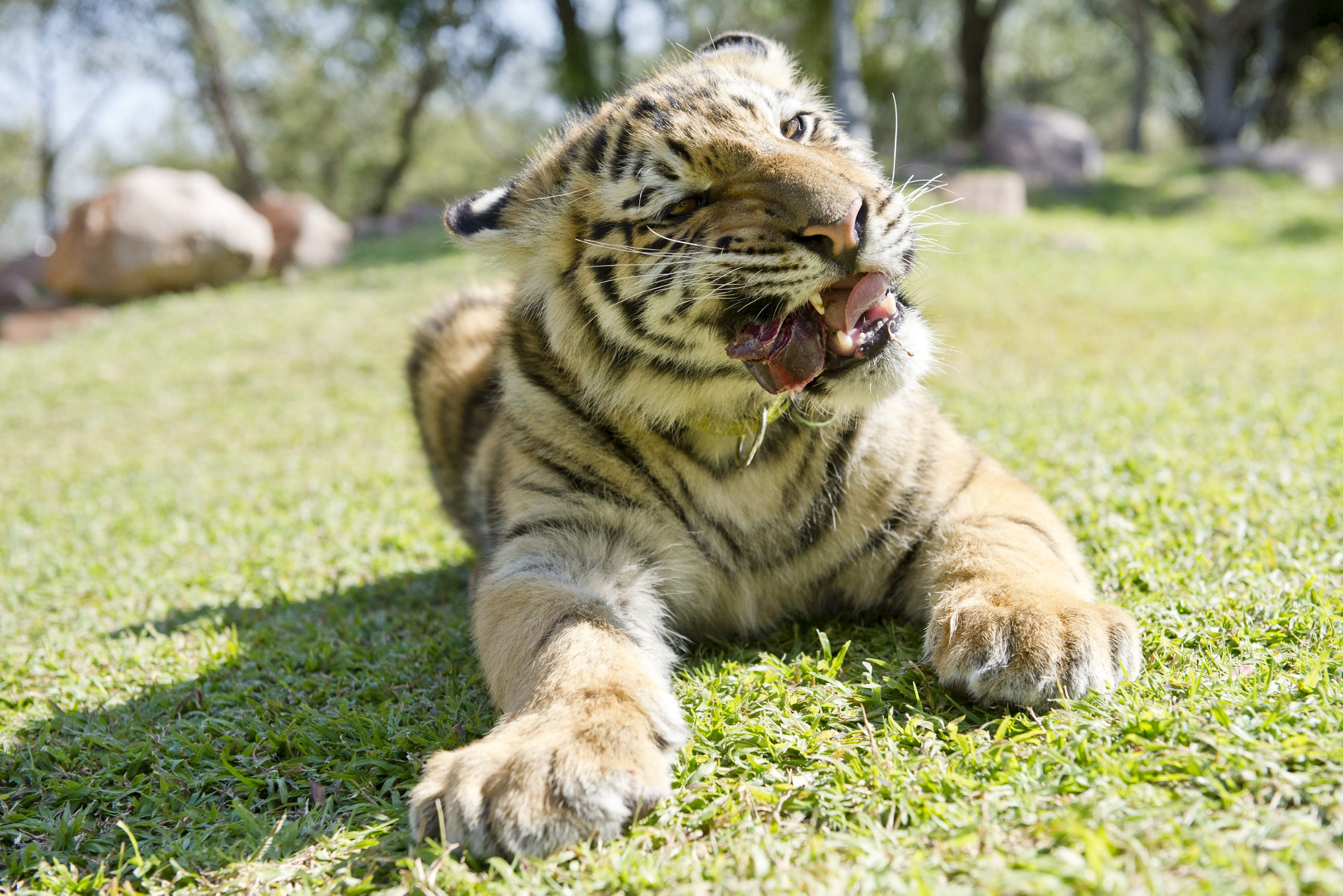 Panjo at Jugomaro Predator Park on May 21, 2013, in Groblersdal, South Africa. Owner, Goosey Fernandes, is an active advocate for the conservation of these predators. Fernandes first made headlines when Panjo fell off the back of his bakkie and was lost in the area for two days. Image: Gallo Images / Foto24 / Craig Nieuwenhuizen
Panjo at Jugomaro Predator Park on May 21, 2013, in Groblersdal, South Africa. Owner, Goosey Fernandes, is an active advocate for the conservation of these predators. Fernandes first made headlines when Panjo fell off the back of his bakkie and was lost in the area for two days. Image: Gallo Images / Foto24 / Craig Nieuwenhuizen
Additionally, there’s the risk that improperly kept big cats pose to people; after all, they are powerful carnivorous animals that survive by killing other animals for their meat.
Just this year, a few tigers have gone on escapades through Johannesburg. One was put down after attacking a man and killing several animals; another was spotted across the road from Toddlers Corner children’s nursery. A lion was spotted in Gauteng close to the border with North West and is still on the loose at the time of publication. These escapes also bring human rights into the discussion in that such powerful predators can pose a safety risk to nearby communities.
Smuts’s opinion is that the government has resisted stronger enforcement because of how much money is involved in the industry
“The very big problem here is that we as a society want to commoditise absolutely everything, and at the buyers’ end, people don’t necessarily distinguish whether the rhino horn or tiger claw is from a poached or farmed animal. It’s almost impossible to know whether the commodity is coming from the so-called legal trade as opposed to the illegal trade. So the very existence of trade provides the opportunity for illegal trade to enter. It exists because of the massive flow of money.”
“The South African State has sold their souls to what they call ‘sustainable utilisation’, which we [The Landmark Foundation] believe should rather be called the sustained abuse of wildlife. What value does a black mamba have to the state, for example? Any animal that hasn’t been commoditised is devalued in the system. That’s the anathema of what biodiversity is. There’s a big lobby and you know, the president himself is a bloody game trader! So it’s completely driven by money.”
In 2020, the wildly popular Netflix docuseries, Tiger King, gave the big cat trade more global exposure than ever before, and has recently resulted in the US Senate passing the Big Cat Public Safety Act which prohibits owning big cats as well as any public contact with them. The question for South Africa is why we have not yet followed suit.
The rise in elephant poaching off the back of the legal ivory “fire sale” in 2008 is well documented. Similar correlations lead to the criminalisation of rhinoceros and lion breeding, and conservationists argue that it is no less the case for tigers and other exotic big cats. DM/ ML OBP




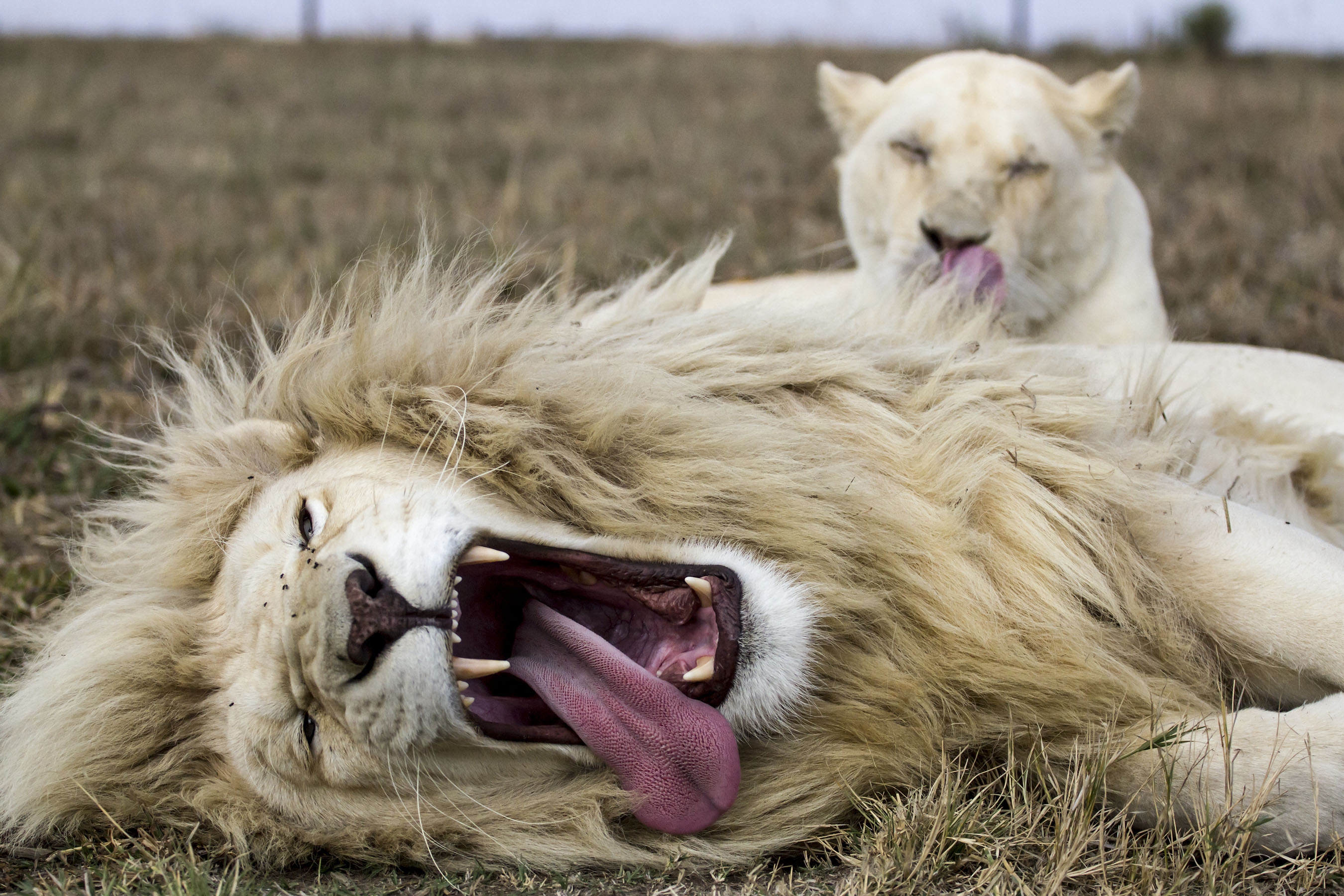 Panjo at Jugomaro Predator Park on May 21, 2013, in Groblersdal, South Africa. Owner, Goosey Fernandes, is an active advocate for the conservation of these predators. Fernandes first made headlines when Panjo fell off the back of his bakkie and was lost in the area for two days. Image: Gallo Images / Foto24 / Craig Nieuwenhuizen
Panjo at Jugomaro Predator Park on May 21, 2013, in Groblersdal, South Africa. Owner, Goosey Fernandes, is an active advocate for the conservation of these predators. Fernandes first made headlines when Panjo fell off the back of his bakkie and was lost in the area for two days. Image: Gallo Images / Foto24 / Craig Nieuwenhuizen 